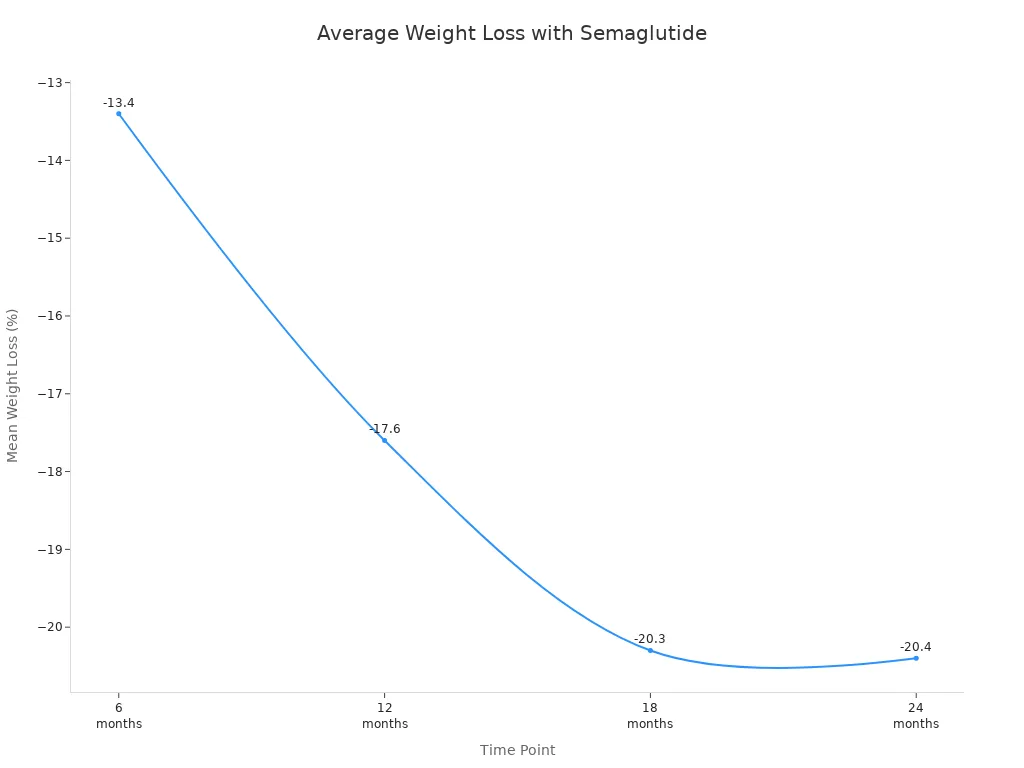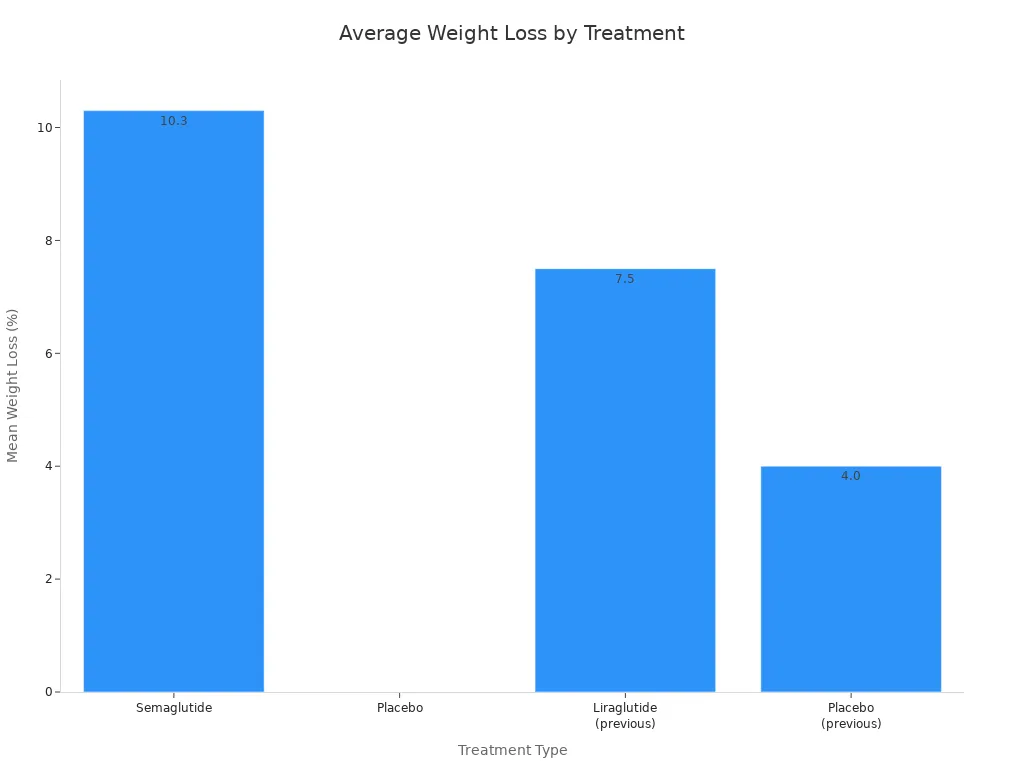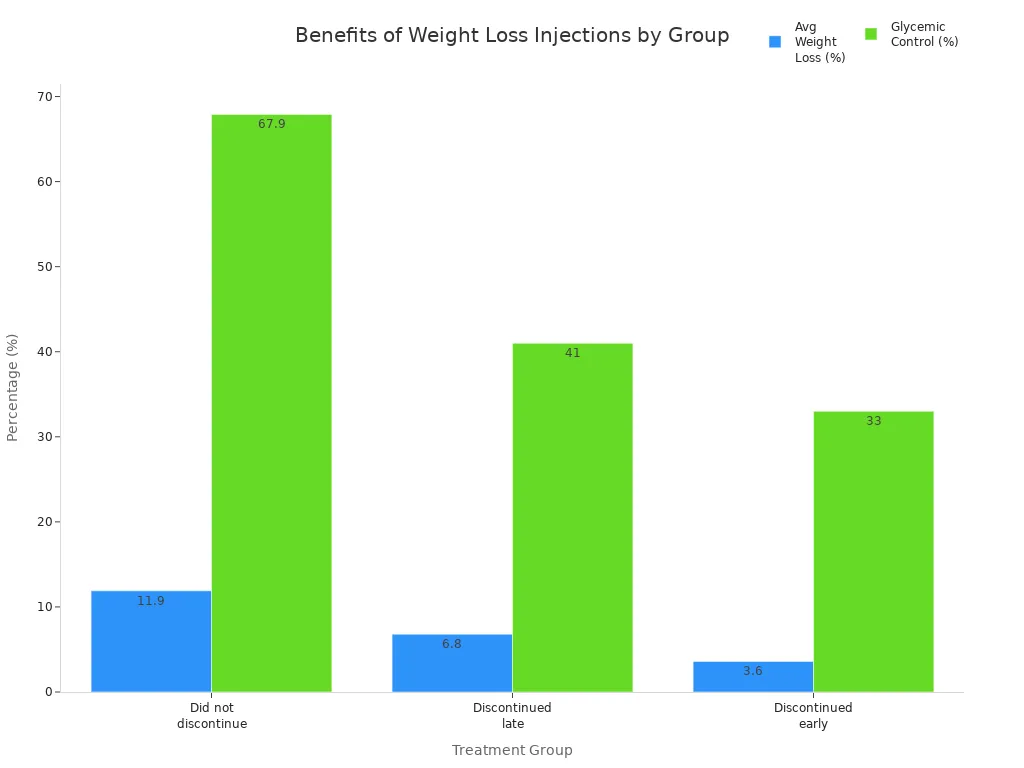You may ask if weight loss injections can help you. These treatments help you lose weight by making you less hungry. They also help your body burn calories faster. Around 12.4% of adults in the U.S. use these treatments now. Studies show people lose weight for a long time, especially if they have health problems. Some people feel sick or have stomach problems. AOMA gives safe and new ways to help you lose weight.
Key Takeaways
Weight loss injections, like semaglutide, can help you feel less hungry. They can also help your body burn more calories. This can lead to a lot of weight loss over time.
Fat dissolving injections work on stubborn fat in certain spots. They are not for losing weight all over your body. They work best for shaping small problem areas.
Talk to your doctor to see if weight loss injections are good for you. This is important if you have health problems or take other medicines.
How Weight Loss Injections Work

Many people want to know how weight loss injections help. These treatments use science to change how your body feels hunger and uses fat. Let's look at how they work and what you might notice.
Semaglutide Injections Explained
Semaglutide injections have changed how people deal with obesity. When you use semaglutide, it works with your brain and body. It helps you eat less and burn more energy. Here is what happens:
Mechanism | Description |
GLP-1 Receptor Interaction | Semaglutide connects with GLP-1 receptors in your brain to reduce hunger. |
Appetite Regulation | It helps you feel full by turning on “fullness” signals and turning off “hunger” signals. |
Leptin Interaction | Semaglutide helps your body use leptin, a hormone that controls appetite. |
Energy Metabolism | It boosts your body's ability to burn calories and manage weight. |
Semaglutide injections do more than make you less hungry. They slow down your stomach, so you feel full longer. They also help your body send signals to your brain that you have eaten enough.
Most people start with a small dose. You might begin with 0.25 mg once a week for the first month. After that, your doctor may raise the dose to 0.5 mg weekly. Later, you might get 1.0 mg or even 2.4 mg per week if needed. This slow increase helps your body get used to the medicine and lowers side effects.
AOMA's semaglutide injections follow this plan. You get a simple shot once a week, usually in your belly or arm. Many people see results fast. Clinical trials show people can lose up to 13.4% of their body weight in six months. Some people lose over 20% after two years.


You can see that semaglutide injections help with long-term weight loss. They work best when you also eat healthy and stay active.
Fat Dissolving Injections Overview
Fat dissolving injections give you another way to target stubborn fat. These shots work best for small areas, like under your chin or around your belly. They use special ingredients to break down fat cells. Your body then removes the fat naturally.
Mechanism | Description |
Active Ingredients | Most fat dissolving injections use deoxycholic acid or phosphatidylcholine. |
Action | These ingredients break open fat cells and turn solid fat into liquid. |
Elimination | Your body clears out the liquid fat through the lymphatic system. |
When you get these injections, you may notice swelling, redness, or mild pain where you got the shot. These effects usually go away after a few days. Most people need two to four sessions to see the best results. Each session can reduce fat in the treated area by 20-30%.
Tip: Fat dissolving injections are not for overall weight loss. They work best for shaping small problem spots.
Ozempic for Weight Loss
You may have heard about Ozempic for weight loss. Ozempic uses the same main ingredient as semaglutide injections, but there are some key differences.
Feature | Ozempic | Semaglutide (Wegovy) |
FDA Approval | Type 2 diabetes | Chronic weight management |
Dosing Regimen | Once weekly (lower doses) | Once weekly (higher doses) |
Average Weight Loss | 9.4% in SUSTAIN 7 trial | 15% in STEP trial |
Side Effects | Similar to semaglutide | Similar to Ozempic |
Cost | Usually more affordable | Usually less affordable |
Ozempic is approved to help people with type 2 diabetes control their blood sugar. It also lowers the risk of heart and kidney problems. Doctors sometimes prescribe Ozempic for weight loss, but it is not officially a weight loss drug. In studies, people using Ozempic lost about 9.4% of their body weight. People using higher-dose semaglutide (like Wegovy) lost about 15%.
Ozempic is best for people with diabetes who also want to lose weight.
Semaglutide injections like Wegovy are made for people with obesity who need help with weight loss.
Both options work by helping you feel full and eat less, but the doses and goals are different.
If you want to use weight loss injections, talk to your doctor about which one fits your needs. AOMA offers semaglutide injections designed for safe and effective weight management, especially for people dealing with obesity.
Benefits & Safe Use
Weight Management Benefits


If you want to manage your weight, you want something that works. Weight loss injections can help you reach your goals. They make it easier to eat less and stop cravings. These shots help you eat fewer calories and burn more calories. This leads to real changes in your body. Many people see big changes in their weight and health with these treatments.
Let's look at how weight loss injections compare to other choices:
Treatment Type | Mean Weight Loss (%) | Comparison to Placebo (%) |
Semaglutide | 10.3 | +10.3 |
Placebo | 0 | - |
Liraglutide (previous) | 7.5 | +3.5 |
Placebo (previous) | 4.0 | - |


People using semaglutide lose more weight than those using older medicines or a placebo. Most people lose about 10% of their body weight. This helps stop problems like high blood pressure and diabetes. You also get better control of your blood sugar.
Treatment Group | Average Weight Loss (%) | Glycemic Control (%) |
Did not discontinue | 11.9% | 67.9% |
Discontinued late | 6.8% | 41% |
Discontinued early | 3.6% | 33% |


Weight loss injections are easy to use. You only need a shot once a week or every two weeks. There is no surgery or long recovery time. You can keep doing your normal activities. These treatments do not leave scars or need you to rest for days.
Note: Weight loss injections work best with healthy eating and exercise. They help you manage extra weight, but you still need to make good choices.
Who Should Consider Weight Loss Injections
Not everyone needs weight loss injections. They can help if you have trouble losing weight with diet and exercise. You might think about these shots if you have a high BMI or health problems like type 2 diabetes or high cholesterol. Some people use these injections even if they do not have diabetes.
You may be a good fit if you:
Have trouble losing weight with just lifestyle changes.
Have a BMI over 30, or over 27 with health problems.
Want to stop health problems and get healthier.
Need help eating less and stopping cravings.
Want a non-surgical way to manage your weight.
Some people should not use these treatments. Certain health problems and medicines can make them risky. Here is a table to show who should not use weight loss injections:
Pre-existing Condition/Medication | Explanation |
Medullary Thyroid Carcinoma (MTC) | Higher risk of thyroid tumors, including cancer. |
Multiple Endocrine Neoplasia type 2 (MEN 2) | High risk of getting thyroid tumors. |
Allergies to Semaglutide | Can cause mild to very bad allergic reactions. |
Severe Gastrointestinal Disorders | May make stomach problems worse. |
Pregnancy/Breastfeeding | We do not know if it is safe for babies. |
Insulin and Other Diabetes Medications | Higher risk of low blood sugar when mixed. |
Oral Medications | Slower stomach emptying may slow medicine absorption. |
Blood Thinners (e.g., Warfarin) | Can change how your blood clots. |
Hormonal Contraceptives | May change how well birth control works. |
Beta-Blockers and ACE Inhibitors | May hide signs of low blood sugar. |
Liver or Kidney Diseases | May need dose changes or may not be safe. |
If you have any of these, talk to your doctor before starting weight loss medicine. A weight management expert can help you decide if this medicine is right for you.
Safe Use and When to Consult a Doctor
Safety is most important with weight loss injections. To stay safe, follow these tips:
1. Only use FDA approved products in clearly labeled, pre-filled pens.
2. Make sure you understand the label and how much to use. Doses for weight loss are not the same as for diabetes.
3. Tell your doctor about side effects like ongoing nausea, stomach pain, or mood changes.
4. Plan for long-term weight management. Ask your provider how to keep the weight off after stopping the medicine.
5. Always talk to a board-certified expert, especially if you are planning cosmetic surgery.
Your clinic should follow strict safety rules for weight loss injections. Here are some important steps:
Always use a new, clean syringe and needle for each person.
Never share medicine vials or syringes between people.
Prepare shots in a clean place and use facemasks if needed.
Give the shot soon after preparing it.
AOMA follows high safety standards for every weight loss shot. The company meets all rules and uses clear labels with instructions and warnings. AOMA also uses risk management to keep you safe during your weight loss journey.
Safety Standard | Description |
Compliance with Regulations | AOMA makes sure all weight loss shots follow the rules to keep you safe. |
Labeling Requirements | Clear labels are required, listing ingredients, instructions, and warnings to keep users safe. |
Risk Management Practices | AOMA uses risk management, including FMEA, to find and lower risks in making the shots. |
Tip: Always talk to your doctor before starting any prescription or weight loss medicine. Your doctor can help you pick the safest and best option for you.
Weight loss injections can help you manage extra weight, reach your goals, and stop health problems. With the right help and safe use, you can enjoy long-term weight management.
Conclusion
Weight loss injections can be a valuable component of a comprehensive weight management plan when administered under the supervision of a qualified healthcare professional. By delivering targeted nutrients, metabolic support, and potential appetite modulation, these therapies may help individuals achieve sustainable progress when paired with balanced diet, regular exercise, and ongoing medical guidance.
If you're exploring high-quality, well-supported options, consider AOMA's weight loss injection products. Our products are designed with rigorous clinical insight, optimized formulations, and a focus on safety and efficacy. To learn more about how AOMA's weight loss injections can fit into patient-centered weight management plan, contact our team for detailed product information.


FAQ
1. What are weight loss injections and how do they work?
Weight loss injections are injectable treatments that deliver Acetyl Hexapeptide-39, or other compounds intended to support metabolism, energy, or appetite regulation.
2. How fast will I see results with weight loss injections?
You may notice changes in your weight within the first week. Most people see steady progress when they stick to their plan.
3. Can I use weight loss injections with other medicines?
You should talk to your doctor first. Some medicines can interact with weight loss injections and may change how your body reacts.
4. Do weight loss injections hurt?
You might feel a small pinch or mild soreness at the injection site. Most people say the discomfort goes away quickly.
5. Can weight loss injections replace diet and exercise?
They are usually intended to complement a balanced diet and regular physical activity, not replace them. For sustainable weight loss, injections should be part of a comprehensive plan including lifestyle changes and medical guidance.



























